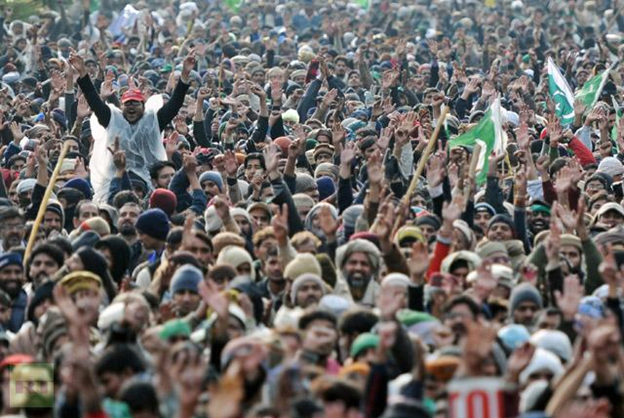Three Developments And Five Questions: Advantage, Pakistan Army
Protesters in Islamabad stay the course

NEW DELHI: The situation in Pakistan has escalated into a confrontation between the Opposition and the government that few had predicted, or taken seriously, when leaders Imran Khan and cleric Tahir ul Qadri started the march to Islamabad for the ouster of the Nawaz Sharif government. It has now assumed proportions that are giving democratic Pakistan nightmares of an army coup, as both sides are refusing to blink in this confrontation and are relying heavily on the Army Chief General Raheel Sharif to restore peace in Pakistan.
Three major developments after the Army stepped in to mediate have changed the dynamics of this protest. One, the clash between the protesters and the police that led to the death of three with hundreds injured. This has given a serious dimension to the protest, with hardened cynics now accepting that Khan and Qadri had not organised the protest for attention but were serious about their demands. However, many in Pakistan feel that they were compelled by circumstances to become serious, given the derision in the media because of which they could not have withdrawn losing face and political standing in the country.
Two, the announcement by MQM’s Altaf Hussain that he would join the protest. The MQM had raised questions about the bonafides of the protest, then tried to mediate, and now has blamed the Sharif government for not talking with sincerity. Hussain has said that the MQM workers would join the protest if the impasse continued. Muttahida Qaumi Movement leader Dr Farooq Sattar has said that his party will have no option but to take to the streets if crackdown on protesters continues in Islamabad.
He told reporters that by using force the government had ruined MQM efforts to end the crisis peacefully.
He asked the government to stop using state power against the protesters who he said were exercising their constitutional and legal right. “We are already under immense pressure and we would be compelled to take to the road if the government action against protesters continues.” Sattar said that the MQM would announce its plan of action soon.
And three, the Army commanders met to discuss the present political situation and after a four hour meeting let it be known that they were wedded to democracy and not interested in direct power. After a lengthy four hour meeting at General Headquarters, the Pakistan Army corps commanders came out with a statement "reaffirming support to democracy" and reiterating that the current stand-off between the PML-N led government and the Pakistan Tehreek-I-Insaaf (PTI), Pakistan Awami Tehreek (PAT) needed a political solution.
The meeting, which was headed by Chief of Army Staff (COAS) General Raheel Sharif, saw the corps commanders reject "further use of force" in the crisis, an Inter-Services Public Relations (ISPR) press release stated.
The commanders also expressed "serious concern" over the violent turn of events in the federal capital.
"The Army remains committed to playing its part in ensuring security of the state and will never fall short of meeting national aspirations," the press release said.
The Dawn newspaper reported that General Raheel Sharif took the commanders into confidence over his meetings with Prime Minister Nawaz Sharif, PTI Chief Imran Khan and PAT Chief Tahirul Qadri last week.
The critical meeting was preponed given the intense speculation and worry in several sections in Pakistan about the possibility of a military takeover.
Significantly, the course of events raise more questions than these answer with many in Pakistan believing that the trajectory seems to be almost rehearsed and following a set pattern. The questions that political pundits and senior journalists in Pakistan have no real answers for are:
1. How is it that both Khan and Qadri began their movement at the same time, and without apparent consultation or coordination?
2. What was the trigger for the sudden decision to demand the resignation of the Nawaz Sharif government at this juncture? There was no direct provocation of the opposition by the government, and given the fact that electoral rigging is one of the main charges why did not Khan and Qadri raise the issue earlier?
3. Who asked the Army to mediate between the two sides? The government claims it did not. The Army insists it did.
4. The protesters attacked and took over Pakistan national television. The Army took it back, and now PTV is at the moment under Army control. Were they working in tandem?
5. Who benefits from this confrontation? The Sharif government has most certainly lost ground. Khan and Qadri have gained some, and lost some, with the assessment in polarised Pakistan fluctuating at the moment. The Army has gained particularly because of its seeming unwillingness to assume power, and its avowed commitment to a “political solution.”
The face off thus will give a decided edge to the Army and a space that it needs to regain lost footing in the areas of security and strategy. General Sharif knows that the mood of Pakistan is completely against military rule, and hence it is very likely that he will not be tempted to take over at this stage. The jostling that has assumed a more deadly hue with the death of three protesters will basically re-establish the control of the Army, with a weak and hence more pliable government in Islamabad.



